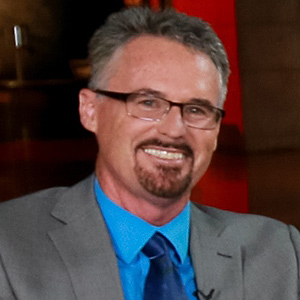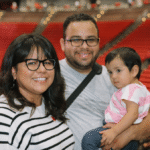
John Putman
Students who’ve taken SDSU Associate Professor John Putman’s Star Trek, Culture and History course know how surprising and fascinating it is to look at political, social, and cultural issues of American history through the lens of Star Trek. What they may not know is that the course led to an entirely new teaching experience for Putman — one he has maintained for the last eight years.
In 2010, an enthusiastic student happened to mention the course to the director of the Osher Lifelong Learning Institute at SDSU, where she was a student assistant. Then Director Rebecca Kanter was immediately intrigued and invited Putman to teach the course to the age 50+ students of Osher. The six-week course was a hit.
“I thoroughly enjoyed my first class and still enjoy them to this day,” said Putman. “It’s nice to have students who are really interested in whatever topic I’m teaching and who often have something to offer that enhances the course. They say that as people age they become more interested in history, and I have found that to be true.” Although there are no tests or grades at Osher at SDSU, Putman noted that many students take notes and even ask for copies of the PowerPoint presentations they missed.
The idea for the course came to Putman during a history writing seminar for which he was a teaching assistant. “The course spent time on American slavery and I noticed a similarity between the pro-slavery rhetoric in the pre-Civil War era and an episode of Star Trek: The Next Generation in which the android Data was on trial for his life,” said Putman. “Whoopi Goldberg was a character in that series who suggested in a conversation with the ship’s captain that Data’s dilemma resembled 19th century views of slaves. I showed the episode in my class and had students read a couple of pro-slavery writings and they wrote a paper comparing the two. After that I began to watch the shows differently and realized that I could construct a course using Star Trek as a vehicle to explore post WWII America.”
Putman was initially a zoology major until he took a course on World War II. “It focused largely on the period between WWI and WWII and we explored the politics and intrigue of Nazi Germany and the other combatant nations. After that course, which I took for credit/no credit, I decided to change my major to history even though it meant two additional years before I could graduate.”
Putman earned his B.A. in history from SDSU and his Ph.D. in history from UCSD. He specializes in history of the American West and California, and has shared his wealth of knowledge with Osher students over the years. He finds that courses and lectures dealing with post WWII America resonate the most with this audience. “They’ve lived through these times and have a personal connection to the issues and topics we cover,” he said.
As Osher member Deborah Carson noted about Putman’s Cold War America course, “I needed to see this time frame from a historical perspective rather than just as a kid living through it. The way Mr. Putman covers the political, social, and economic views of the time gives you a good historical perspective of any age.”
Putman’s hope for what students will take away? “If they don’t already have a strong appreciation for history, I hope they leave a course with it, especially if it’s a topic they thought they were not sure they would like,” he said. “For others it might be that they discovered a different perspective on a particular historical topic that they didn’t consider before.”
Twenty-four of Putman’s fellow professors are teaching this semester at Osher at SDSU, sharing their expertise on topics ranging from chamber music, Charlie Chaplin, and Shakespeare; to social media, the science of addiction, and natural disasters. Those interested in being guest lecturers this fall are encouraged to submit an Osher Fall 2018 Course Proposal Form by March 12.
“Every semester, the 600-plus active members of Osher at SDSU come to campus in pursuit of their love of learning, and they would love to learn from our esteemed faculty,” said Program Director Aimee Davis. “They’re particularly eager to hear about research, and tour campus facilities if possible.”
For his fellow professors, Putman had these words of encouragement: “You would not regret the opportunity to teach a course at Osher. Not only will you have actively engaged students , but also ones who always have something to add to your course. Also, you don’t have any grading to do!”




